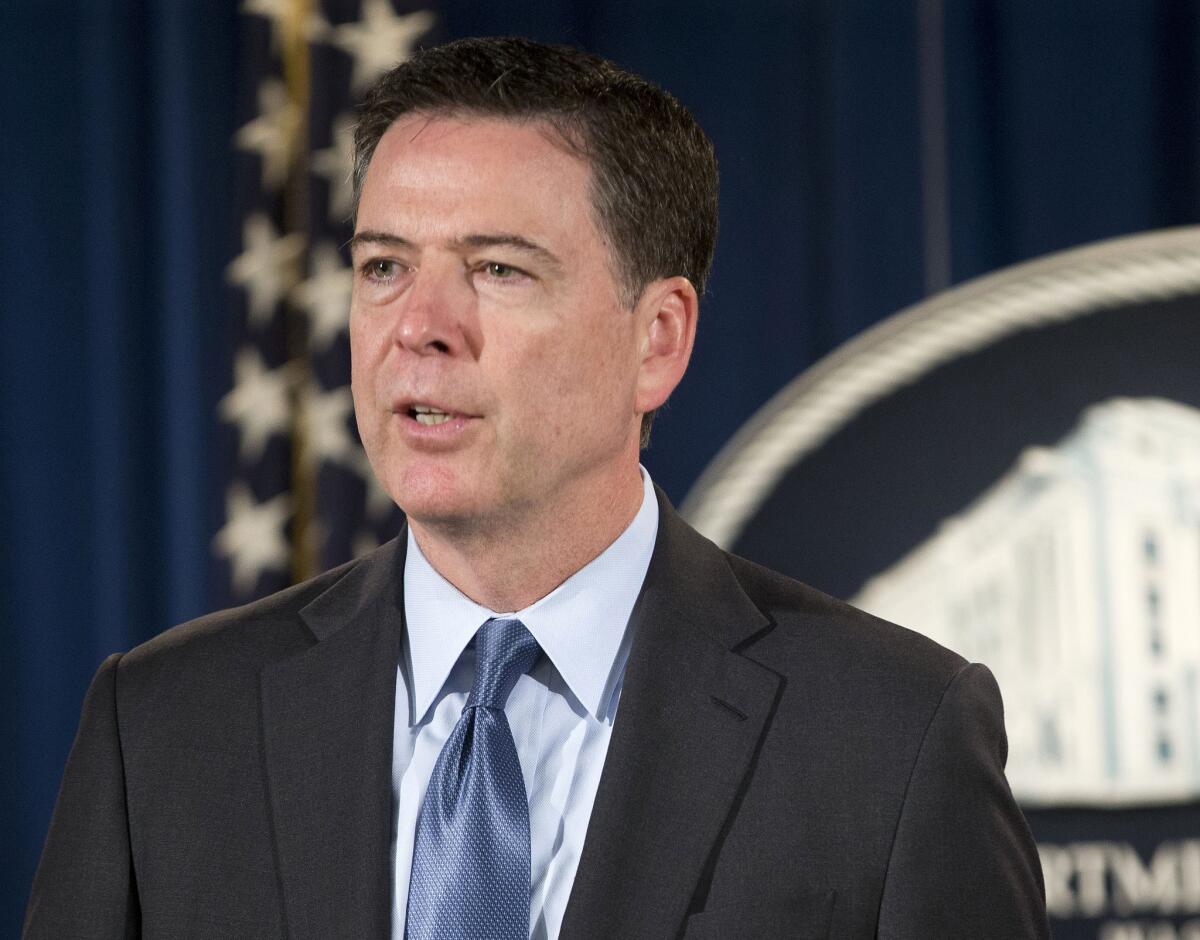FBI says it is refocused on movement of Islamic State recruits into U.S.

FBI Director James B. Comey.
- Share via
Reporting from Washington — The deadly rampages in Paris and San Bernardino have added new urgency to Obama administration efforts to prevent fighters who trained with Islamic State or other extremist groups in Iraq and Syria from launching terrorist attacks when they return home.
FBI Director James B. Comey said at a Senate hearing Wednesday that Islamic State remains intent on sending militants into the United States as well as inspiring Americans and visa holders already here to conduct attacks.
“They are trying to do two things: They are trying to motivate people already in the United States to become killers on their behalf, and they would very much like to, as they aspire to be the leader in the global jihad, send people here to the United States to launch attacks,” Comey told the Senate Judiciary Committee.
FULL COVERAGE: Terror attack in San Bernardino >>
He said U.S. authorities have not found evidence that the extremist group based in Syria and Iraq has specifically sent anyone to America.
But his testimony came as authorities in France said they had identified a 23-year-old man from Strasbourg, France, as the third shooter in the assault on the Bataclan music hall in Paris on Nov. 13.
Foued Mohamed Aggad went to Syria to join Islamic State in late 2013. But he managed to slip back into France and was among three gunmen who killed 90 people in the Bataclan, officials said, the worst death toll in a series of attacks that left 130 people dead in and around the capital.
Europeans trained by Islamic State in Syria were largely if not entirely responsible for the attacks that night. They used Belgian and French passports to move easily across open borders in Europe before and after the attack, and at least one reportedly entered by joining the flood of refugees fleeing Syria’s civil war.
Sen. Charles E. Grassley (R-Iowa), chairman of the Judiciary Committee, said the National Counterterrorism Center also has identified people “with ties to terrorists in Syria who are attempting to enter the United States through the refugee program.”
He did not provide details, but said that counter-terrorism officials believe Islamic State and other extremist groups are testing U.S. immigration programs to see whether they can smuggle operatives or followers into the country.
U.S. officials estimate that 30,000 people from more than 100 countries — including about 4,000 with European passports and dozens of Americans — have joined the conflict in Iraq and Syria over the last four years and could pose a long-term danger to the United States and its allies.
The total is almost double the number of foreign fighters who flocked to Afghanistan in the 1980s to fight the Soviet Union, a war that spawned Al Qaeda.
“We’ve never seen anything like this historically,” said a senior U.S. official, who spoke on condition of anonymity to brief reporters.
The official said the number of foreigners trying to get to Syria has leveled off in recent months, partly as a result of stepped-up airstrikes by the U.S.-led coalition on Islamic State positions and intensified efforts by Turkey and other countries to control their borders. A 60-mile stretch of Turkey’s border with Syria remains open, however.
Ben Rhodes, deputy national security advisor, said the White House is focused on improving intelligence sharing and law enforcement agreements with partners in Europe “so that there’s better screening of where people have traveled.”
“Part of the challenge is there are all of these different European laws,” he said. “We want them to harmonize their laws and approaches … so that we’re not doing it 28 different ways.”
Josh Earnest, the White House press secretary, said the administration is urging European countries to do a better job of collecting and sharing passenger records and computerized data that contain the itinerary of an individual or groups traveling together on trains, planes or buses.
“There obviously is a roiling debate in Europe about where to draw the line in terms of balancing national security and privacy,” he said. “Those kinds of debates are not easily resolved. You know, there have been some roiling debates here in this country about the best way to resolve that, so it’s not surprising that that is happening in Europe as well.”
Rob Malley, the White House coordinator for countering Islamic State, said U.S. officials are trying to push European allies to share more “in real time … the information they have about where people are traveling.”
No evidence suggests Syed Rizwan Farook and his wife, Tashfeen Malik, traveled to Iraq or Syria before they shot and killed 14 people in San Bernardino on Dec. 2. She was born in Pakistan and lived for many years in Saudi Arabia, and he traveled to Saudi Arabia at least twice.
The FBI is searching for clues that Islamic State or another group introduced the couple, or helped them plan the San Bernardino assault. Comey said the couple pledged their allegiance to Islamic State shortly before they were killed in a shootout with police.
Times staff writers Richard A. Serrano and Michael A. Memoli contributed to this report.
ALSO
Listen to the police calls as the deadly rampage unfolded
ACLU argues the U.S. is dragging its feet on why people are on that ‘no-fly’ list
Enrique Marquez, who bought rifles used in San Bernardino attack, had deep ties to gunman
More to Read
Sign up for Essential California
The most important California stories and recommendations in your inbox every morning.
You may occasionally receive promotional content from the Los Angeles Times.













